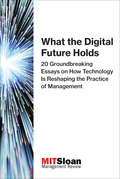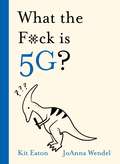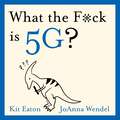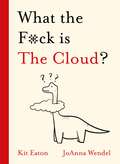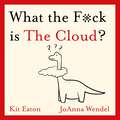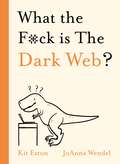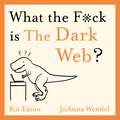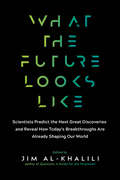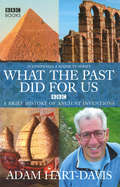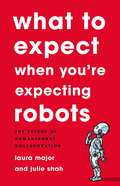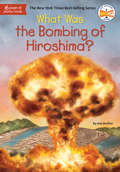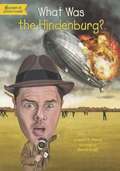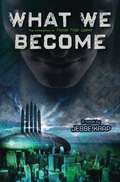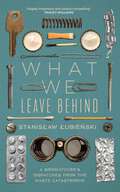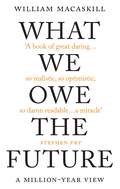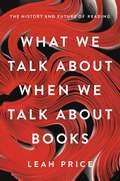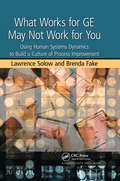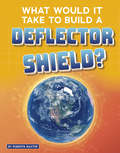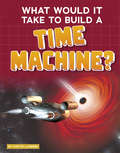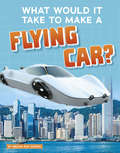- Table View
- List View
What the Digital Future Holds: 20 Groundbreaking Essays on How Technology Is Reshaping the Practice of Management (The Digital Future of Management)
by MIT Sloan Management ReviewThe relationship between management and digital technology: experts present a new agenda for the practice of management.Digital technology has profoundly affected the ways that businesses design and produce goods, manage internal communication, and connect with customers. But the next phase of the digital revolution raises a new set of questions about the relationship between technology and the practice of management. Managers in the digital era must consider how big data can inform hiring decisions, whether new communication technologies are empowering workers or unleashing organizational chaos, what role algorithms will play in corporate strategy, and even how to give performance feedback to a robot. This collection of short, pithy essays from MIT Sloan Management Review, written by both practitioners and academic experts, explores technology's foundational impact on management.Much of the conversation around these topics centers on the evolving relationship between humans and cognitive technologies, and the essays reflect this—considering, for example, not only how to manage a bot but how cognitive systems will enhance business decision making, how AI delivers value, and the ethics of algorithms.ContributorsAjay Agrawal, Robert D. Austin, David H. Autor, Andrew Burgert, Paul R. Daugherty, Thomas H. Davenport, R. Edward Freeman, Joshua S. Gans, Avi Goldfarb, Lynda Gratton, Reid Hoffman, Bala Iyer, Gerald C. Kane, Frieda Klotz, Rita Gunther McGrath, Paul Michelman, Andrew W. Moore, Nicola Morini-Bianzino, Tim O'Reilly, Bidhan L. Parmar, Ginni Rometty, Bernd Schmitt, Alex Tapscott, Don Tapscott, Monideepa Tarafdar, Catherine J. Turco, George Westerman, H. James Wilson, Andrew S. Winston
What the F*ck is 5G? (What the *&%^)
by Kit EatonWhat the f*ck is 5G, and how does it even work?The world loves 4G phones, tablets and other gizmos and we take the tech for granted...but when that 4 grew up into the next-gen 5, it seems everyone perked up and started caring about phone networking tech. Journalists journaled, politicians, er, politicked, and tin-foil hat wearers reached for the extra-thick reinforced foil. Why all this fuss? Believe it or not, 5G could change the way you live. Because though it seems like smartphones are only good for tiktok and texting, 5G has the power to revolutionise how we interact with public spaces - from concerts and gigs to coffee shops, paving the way for foundational tech like virtual and augmented reality. This book will explain this missing radio link that will propel us into the future of self-driving cars and VR. Oh, and along the way we'll explore why 5G and coronavirus are very definitely and completely, utterly, not the same thing
What the F*ck is 5G? (WTF Series)
by Kit EatonWhat the f*ck is 5G, and how does it even work?The world loves 4G phones, tablets and other gizmos and we take the tech for granted...but when that 4 grew up into the next-gen 5, it seems everyone perked up and started caring about phone networking tech. Journalists journaled, politicians, er, politicked, and tin-foil hat wearers reached for the extra-thick reinforced foil. Why all this fuss? Believe it or not, 5G could change the way you live. Because though it seems like smartphones are only good for tiktok and texting, 5G has the power to revolutionise how we interact with public spaces - from concerts and gigs to coffee shops, paving the way for foundational tech like virtual and augmented reality. This book will explain this missing radio link that will propel us into the future of self-driving cars and VR. Oh, and along the way we'll explore why 5G and coronavirus are very definitely and completely, utterly, not the same thing
What the F*ck is 5G? (What the *&%^)
by Kit EatonWhat the f*ck is 5G and how does it work?The world loves 4G phones, tablets and other gizmos and we take the tech for granted...but when that 4 grew up into the next-gen 5, it seems everyone perked up and started caring about phone networking tech. Journalists journaled, politicians, er, politicked, and tin-foil hat wearers reached for the extra-thick reinforced foil. Why all this fuss? Believe it or not, 5G could change the way you live. Because though it seems like smartphones are only good for tiktok and texting, 5G has the power to revolutionise how we interact with public spaces - from concerts and gigs to coffee shops, paving the way for foundational tech like virtual and augmented reality. This book will explain this missing radio link that will propel us into the future of self-driving cars and VR. Oh, and along the way we'll explore why 5G and coronavirus are very definitely and completely, utterly, not the same thing.(P) 2021 Hodder & Stoughton Ltd
What the F*ck is The Cloud? (WTF Series)
by Kit EatonWhat the f*ck is the Cloud, and how does it even work?Ah, The Cloud. It's such a useful bit of tech jargon isn't it? The kind that's casually thrown around in work meetings by bosses who (kind of) understand and maybe even at the nerdier type of dinner or drinks parties. People joke about the cloud while others take it for granted and some worry about this mysterious entity where all of our data is stored, accessible at the touch of a screen from anywhere on Earth. But what even is the cloud, and for that matter, where is the cloud?Join us on a journey from the very first iterations of the internet that we know and (sometimes) love, all the way through thorny issues of data collection and storage (weren't we all fooled by the 'ten years on' social media trend, even as we rely on cloud-stored photos of cats to cheer us up?) and discover the mysterious place where The Cloud ominously hovers.
What the F*ck is The Cloud? (WTF Series)
by Kit EatonWhat the f*ck is the Cloud, and how does it even work?Ah, The Cloud. It's such a useful bit of tech jargon isn't it? The kind that's casually thrown around in work meetings by bosses who (kind of) understand and maybe even at the nerdier type of dinner or drinks parties. People joke about the cloud while others take it for granted and some worry about this mysterious entity where all of our data is stored, accessible at the touch of a screen from anywhere on Earth. But what even is the cloud, and for that matter, where is the cloud?Join us on a journey from the very first iterations of the internet that we know and (sometimes) love, all the way through thorny issues of data collection and storage (weren't we all fooled by the 'ten years on' social media trend, even as we rely on cloud-stored photos of cats to cheer us up?) and discover the mysterious place where The Cloud ominously hovers.
What the F*ck is The Cloud? (WTF Series)
by Kit EatonWhat the f*ck is the the Cloud and how does it work?Ah, The Cloud. It's such a useful bit of tech jargon isn't it? The kind that's casually thrown around in work meetings by bosses who (kind of) understand and maybe even at the nerdier type of dinner or drinks parties. People joke about the cloud while others take it for granted and some worry about this mysterious entity where all of our data is stored, accessible at the touch of a screen from anywhere on Earth. But what even is the cloud, and for that matter, where is the cloud?Join us on a journey from the very first iterations of the internet that we know and (sometimes) love, all the way through thorny issues of data collection and storage (weren't we all fooled by the 'ten years on' social media trend, even as we rely on cloud-stored photos of cats to cheer us up?) and discover the mysterious place where The Cloud ominously hovers.(P) 2021 Hodder & Stoughton Ltd
What the F*ck is The Dark Web? (WTF Series)
by Kit EatonWhat the f*ck is the Dark Web, and how does it even work?Whether it's from dodgy acronym-titled crime shows to news stories designed to terrify you down to your socks we've all heard about sites like Silk Road and the ways criminals use cryptocurrency online. But did you know that among the various shady corners of the dark web you can also find portals to the BBC and Facebook?The thing is even the way the everyday internet works is a mystery to us and its darkest corners are, of course, more deeply shrouded. So, let's go on a journey from the birth of the Net through the strangest dark services - need a hitman to bump off your superfluous...er...beloved spouse? - to the surprisingly positive uses of dark technology, including dodging the watchful eye of oppressive censors.Over half of us can't remember a time before the internet - and for the rest it's increasingly difficult to imagine life without the damn thing! It's about time we understood more about it and we can start with the question: What The Fuck is The Dark Web?
What the F*ck is The Dark Web? (WTF Series)
by Kit EatonWhat the f*ck is the Dark Web, and how does it even work?Whether it's from dodgy acronym-titled crime shows to news stories designed to terrify you down to your socks we've all heard about sites like Silk Road and the ways criminals use cryptocurrency online. But did you know that among the various shady corners of the dark web you can also find portals to the BBC and Facebook?The thing is even the way the everyday internet works is a mystery to us and its darkest corners are, of course, more deeply shrouded. So, let's go on a journey from the birth of the Net through the strangest dark services - need a hitman to bump off your superfluous...er...beloved spouse? - to the surprisingly positive uses of dark technology, including dodging the watchful eye of oppressive censors.Over half of us can't remember a time before the internet - and for the rest it's increasingly difficult to imagine life without the damn thing! It's about time we understood more about it and we can start with the question: What The Fuck is The Dark Web?
What the F*ck is The Dark Web? (WTF Series)
by Kit EatonWhat the f*ck is the dark web and how does it work?Whether it's from dodgy acronym-titled crime shows to news stories designed to terrify you down to your socks we've all heard about sites like Silk Road and the ways criminals use cryptocurrency online. But did you know that among the various shady corners of the dark web you can also find portals to the BBC and Facebook?The thing is even the way the everyday internet works is a mystery to us and its darkest corners are, of course, more deeply shrouded. So, let's go on a journey from the birth of the Net through the strangest dark services - need a hitman to bump off your superfluous...er...beloved spouse? - to the surprisingly positive uses of dark technology, including dodging the watchful eye of oppressive censors.Over half of us can't remember a time before the internet - and for the rest it's increasingly difficult to imagine life without the damn thing! It's about time we understood more about it and we can start with the question: What The Fuck is The Dark Web?
What the Future Looks Like: Scientists Predict the Next Great Discoveries and Reveal How Today's Breakthroughs Are Already Shaping Our World
by Jim Al-KhaliliGet the science facts, not science fiction, on the cutting-edge developments that are already changing the course of our future.Every day, scientists conduct pioneering experiments with the potential to transform how we live. Yet it isn’t every day you hear from the scientists themselves! Now, award–winning author Jim Al–Khalili and his team of top-notch experts explain how today’s earthshaking discoveries will shape our world tomorrow—and beyond.Pull back the curtain on: genomicsroboticsAIthe “Internet of Things”synthetic biologytranshumanisminterstellar travelcolonization of the solar systemteleportationand much moreAnd find insight into big–picture questions such as:Will we find a cure to all diseases? The answer to climate change? And will bionics one day turn us into superheroes?The scientists in these pages are interested only in the truth—reality-based and speculation-free. The future they conjure is by turns tantalizing and sobering: There’s plenty to look forward to, but also plenty to dread. And undoubtedly the best way to for us to face tomorrow’s greatest challenges is to learn what the future looks like—today.Praise for What the Future Looks Like“A collection of mind-boggling essays that are just the thing for firing up your brain cells.” —Saga Magazine“The predictions and impacts are global . . . [and] the book contains far more fascinating information than can be covered in this review.” —Choice“This book is filled with essays from experts offering their informed opinions on what the science and technology of today will look like in the future, from smart materials to artificial intelligence to genetic editing.” —Popular Science“Fun is an understatement. This is a great collection to get the summer book season started.” —Forbes.com“The focus on sincere, factual presentation of current and future possibilities by leading experts is particularly welcome in this era of fake news and anti-science rhetoric.” —Library Journal
What the past did for us
by Adam Hart-DavisAdam Hart-Davis, one of the nations favourite TV presenters, returns to our screens with a tour through the Top Ten developments of each of the great civilisations of the past. From the Egyptians to the Romans, Babylonians to the Arabs, Adam takes us on an epic history of the world, looking at some of the great legacies left to us by ancient cultures. What the Past Did For Us accompanies a major 9-part new format autumn show, in which Adam is the anchorman who leads us through the history of inventions while testing some of these in the studio. The accompanying book is an entertainingly written history of ancient cultures, capturing Adams enthusiasm for the subject. Adam tells the story of the Chinese inventors who came up with the mariners compass, paper money and gunpowder right through to the Ancient Indians who, according to Einstein taught us how to count as well as giving us the 12-month calendar year and 7-day week.
What To Expect When You're Expecting Robots: The Future of Human-Robot Collaboration
by Laura Major Julie ShahThe next generation of robots will be truly social, but can we make sure that they play well in the sandbox?Most robots are just tools. They do limited sets of tasks subject to constant human control. But a new type of robot is coming. These machines will operate on their own in busy, unpredictable public spaces. They'll ferry deliveries, manage emergency rooms, even grocery shop. Such systems could be truly collaborative, accomplishing tasks we don't do well without our having to stop and direct them. This makes them social entities, so, as robot designers Laura Major and Julie Shah argue, whether they make our lives better or worse is a matter of whether they know how to behave.What to Expect When You're Expecting Robots offers a vision for how robots can survive in the real world and how they will change our relationship to technology. From teaching them manners, to robot-proofing public spaces, to planning for their mistakes, this book answers every question you didn't know you needed to ask about the robots on the way.
What Was It Before It Was Bread?
by Jane Belk MoncureTraces the process by which wheat is grown, cut, ground into different kinds of flour, and baked into bread. Includes a recipe for whole wheat muffins.
What Was the Bombing of Hiroshima? (What Was?)
by Jess Brallier Who HQHiroshima is where the first atomic bomb was dropped. Now readers will learn the reasons why and what it's meant for the world ever since.By August 1945, World War II was over in Europe, but the fighting continued between American forces and the Japanese, who were losing but determined to fight till the bitter end. And so it fell to a new president--Harry S. Truman--to make the fateful decision to drop two atomic bombs--one on Hiroshima and one on Nagasaki--and bring the war to rapid close. Now, even seventy years later, can anyone know if this was the right choice? In a thoughtful account of these history-changing events, Jess Brallier explains the leadup to the bombing, what the terrible results of it were, and how the threat of atomic war has colored world events since.
What Was the Hindenburg?
by Janet Pascal Kevin Mcveigh David GroffAt 800-feet long, the Hindenburg was the largest airship ever built--just slightly smaller than the Titanic! Also of a disastrous end, the zeppelin burst into flame as spectators watched it attempt to land in Lakehurst, New Jersey on May 6, 1937. In under a minute, the Hindenburg was gone, people jumping from windows to escape. However, only 62 of the 97 crew members and passengers onboard survived. The exact cause of the disaster is still unknown and remains a fascinating historical mystery perfect for this series.
What We Become
by Jesse KarpTwo years ago, teenagers Mal and Laura destroyed a corporate empire intent on controlling human thinking through technology. For a while, life was good. But now a new force has arisen: the Old Man. He's hungry for power and he knows who holds the key to getting it: Mal. Mal needs his beloved Laura's help to defeat the Old Man, but is he willing to risk her life in another battle to save humanity? What We Become combines mind-bending thrills with the hot immediacy of corporate greed. It will leave readers wondering who is really in control...
What We Leave Behind: A Birdwatcher's Dispatches from the Waste Catastrophe
by Stanislaw Lubienski"Everything looked perfect. Sand - unique Baltic sand, the best in the world - and the calm sea. But wait. Something was amiss. Something was wrong"It starts with a day at the beach. A single white sock that somehow spoils everything. It's enough to send writer and ornithologist Stanislaw Lubienski on a quest to understand what we throw away, where it goes and whether it will be our legacy. By analysing items he unearths on his trips into nature - a plastic bottle, a tube of Russian penis-enlargement cream, a cigarette butt, an empty aerosol can - tracing their origins and explaining the harm they can do, he shows how consumer society has developed out of control, to the point of environmental catastrophe.He also looks with a birdwatcher's eye at how various animals have come to adapt to and even rely on our rubbish, and interrogates the cultural significance of waste and the origins of our throw-away lifestyles. Finally, he adds a personal touch by examining his own "environmental neurosis" and by going out with refuse crews to watch them work.While Lubienski never hectors his readers, nor shames them, his clear-eyed, persuasive and humble polemic reminds us what we, as individuals, can and cannot do to address an apocalyptic issue while there's still something worth saving.Translated from the Polish by Zosia Krasodomska-Jones
What We Leave Behind: A Birdwatcher's Dispatches from the Waste Catastrophe
by Stanislaw Lubienski"Everything looked perfect. Sand - unique Baltic sand, the best in the world - and the calm sea. But wait. Something was amiss. Something was wrong"It starts with a day at the beach. A single white sock that somehow spoils everything. It's enough to send writer and ornithologist Stanislaw Lubienski on a quest to understand what we throw away, where it goes and whether it will be our legacy. By analysing items he unearths on his trips into nature - a plastic bottle, a tube of Russian penis-enlargement cream, a cigarette butt, an empty aerosol can - tracing their origins and explaining the harm they can do, he shows how consumer society has developed out of control, to the point of environmental catastrophe.He also looks with a birdwatcher's eye at how various animals have come to adapt to and even rely on our rubbish, and interrogates the cultural significance of waste and the origins of our throw-away lifestyles. Finally, he adds a personal touch by examining his own "environmental neurosis" and by going out with refuse crews to watch them work.While Lubienski never hectors his readers, nor shames them, his clear-eyed, persuasive and humble polemic reminds us what we, as individuals, can and cannot do to address an apocalyptic issue while there's still something worth saving.Translated from the Polish by Zosia Krasodomska-Jones
What We Owe The Future: The Sunday Times Bestseller
by William MacAskillThe challenges we face are enormous. But we can still secure a positive future for our planet, and for everyone on it. In What We Owe The Future, philosopher William MacAskill persuasively argues for longtermism, the idea that positively influencing the distant future is a moral priority of our time. It isn&’t enough to mitigate climate change or avert the next pandemic. We can ensure that civilization would rebound if it collapsed; cultivate value pluralism; and prepare for a planet where the most sophisticated beings are digital and not human. 'Unapologetically optimistic and bracingly realistic, this is the most inspiring book on &‘ethical living&’ I&’ve ever read.' Oliver Burkeman, Guardian &‘A monumental event.' Rutger Bregman, author of Humankind &‘A book of great daring, clarity, insight and imagination. To be simultaneously so realistic and so optimistic, and always so damn readable… well that is a miracle for which he should be greatly applauded.&’ Stephen Fry
What We Talk About When We Talk About Books: The History and Future of Reading
by Leah PriceReports of the death of reading are greatly exaggeratedDo you worry that you've lost patience for anything longer than a tweet? If so, you're not alone. <P><P>Digital-age pundits warn that as our appetite for books dwindles, so too do the virtues in which printed, bound objects once trained us: the willpower to focus on a sustained argument, the curiosity to look beyond the day's news, the willingness to be alone. <P><P>The shelves of the world's great libraries, though, tell a more complicated story. <P><P> Examining the wear and tear on the books that they contain, English professor Leah Price finds scant evidence that a golden age of reading ever existed. From the dawn of mass literacy to the invention of the paperback, most readers already skimmed and multitasked. <P><P>Print-era doctors even forbade the very same silent absorption now recommended as a cure for electronic addictions. The evidence that books are dying proves even scarcer. <P><P>In encounters with librarians, booksellers and activists who are reinventing old ways of reading, Price offers fresh hope to bibliophiles and literature lovers alike.
What Works for GE May Not Work for You: Using Human Systems Dynamics to Build a Culture of Process Improvement
by Lawrence Solow Brenda FakeWhat Works for GE May Not Work for You: Using Human Systems Dynamics to Build a Culture of Process Improvement provides new tools for managing and sustaining process improvement in today‘s complex non-linear environments and helps readers apply new, relevant theory to their own management practices. With more than 50 combined years of change manage
What Would It Take to Build a Deflector Shield? (Sci-Fi Tech)
by Roberta BaxterIn science fiction, deflector shields protect ships, bases, and even planets from enemy attack. How could a protective space that absorbs energy from weapons be created? Scientists have some ideas, which include using lasers. Discover the science and technology behind what it would take to make a real-life deflector shield!
What Would It Take to Build a Time Machine? (Sci-Fi Tech)
by Yvette LaPierreIn science fiction, time machines let people travel backward in history and forward to the future. How could one of these time-traveling devices be created? Scientists have some ideas, which include using spaceships and black holes. Discover the science and technology behind what it would take to make a real-life time machine!
What Would It Take to Make a Flying Car? (Sci-Fi Tech)
by Megan Ray DurkinIn science fiction, flying cars let people soar over traffic jams and get to where they're going quickly. How could a vehicle that both flies and drives be created? Scientists' ideas for this involve futuristic materials and technology from drones. Discover the science and technology behind what it would take to make a real-life flying car!
